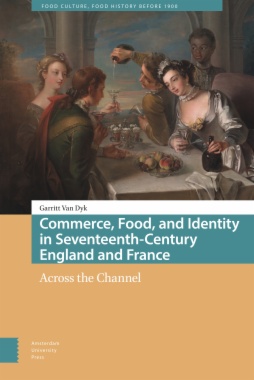“Tell me what you eat, and I’ll tell you who you are” was the challenge issued by French gastronomist Jean Brillat-Savarin. Champagne is declared a unique emblem of French sophistication and luxury, linked to the myth of its invention by Dom Pérignon. Across the Channel, a cup of sweet tea is recognized as a quintessentially English icon, simultaneously conjuring images of empire, civility, and relentless rain that demands the sustenance and comfort that only tea can provide. How did these tastes develop in the seventeenth century?
Commerce, Food, and Identity in Seventeenth-Century England and France: Across the Channel offers a compelling historical narrative of the relationship between food, national identity, and political economy in the early modern period. These mutually influential relationships are revealed through comparative and transnational analyses of effervescent wine, spices and cookbooks, the development of coffeehouses and cafés, and the ‘national sweet tooth’ in England and France.
- Cover
- Table of Contents
- Acknowledgements
- Introduction: The Economics of Taste
- Emblems of Identity: Poulet au pot and Roast Beef
- 1651–1717: Global Commerce and Cultural Identity
- Culinary Hegemony as Cultural Export
- Mercantilism and Non-Traditional Influences on Economic Thought
- De Gustibus Non Est Disputandum: Analysing the Economics of Taste
- Bibliography
- 1. Méthode Anglaise: Transnational Exchange and the Origins of Champagne
- ‘Come, brothers—I am drinking stars!’ (attributed to Dom Pérignon)
- The Paradox of English Effervescence
- Probing the Paradox: Necessity is the Mother of Invention
- ‘Boire à la Françoise’: Baptême et Verjus
- Taxes, Treaties, Embargoes, and Taste
- Mercantilist Pressures on the English Palate
- Bibliography
- 2. Primary Sauces: The Rise of Cookbooks, Cuisines, and Corporations
- The Medieval Tradition of Conspicuous Consumption
- The Emergence of Delicate Dining
- Rejection of Refinement: English Resistance to French Cuisine
- Disconnected Relationships: Price, Value, Supply and Demand
- Bibliography
- 3. London Coffeehouse or Parisian Café?
- Mercantilism, Myth and Grandeur in the Development of Sociable Spaces
- Before the Coffeehouse and Café: The ‘Turk’s Physick’ and ‘Eccentricity of a Traveller’
- Rationalising Luxury in Early Modern Political Economy
- The Success of the Coffeehouse and the Influence of the Virtuosi
- Soliman Aga and the Fashionability of Coffee in France
- An Atmosphere of Grandeur in the Parisian Café
- Botanical Imperialism vs. the Commerce of Empire
- Bibliography
- 4. Sugar and Empire: Tea’s ‘Inseparable Companion’
- English Production: Naturalising Sweetness
- French Production: Toward an Empire of Autarky
- British Consumption: Grandeur through Taxes on ‘Backs and Bellies’
- French Consumption: The Sun King’s Sweet Tooth and the Balance of Trade
- Bibliography
- Conclusion
- Bibliography
- Manuscript Sources
- Printed Primary Sources
- Secondary Literature
- Websites
- Index

